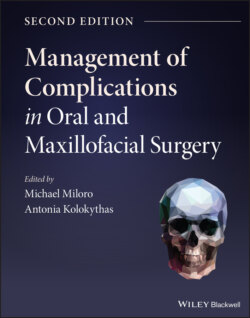Читать книгу Management of Complications in Oral and Maxillofacial Surgery - Группа авторов - Страница 43
IMMUNOLOGICAL COMPLICATIONS Hypersensitivity Reactions
ОглавлениеHypersensitivity, or allergic, reactions are common in the general population and may be produced in the ambulatory anesthesia setting by a variety of common substances. Patients with a history of allergic asthma, atopy, or autoimmune disease may be most at risk. Mild reactions include urticaria, flushing, and pruritis, while more severe reactions can be characterized by angioedema, wheezing, nausea and vomiting, or anaphylaxis. The most common complication is a localized skin reaction, frequently to an adhesive tape used to secure an IV line, for example. Some of the medications used in ambulatory anesthesia (propofol or succinylcholine) have been implicated in allergic reactions, but this is generally rare [20]. Likewise, a true allergy to local anesthetic agents is very infrequent. Most hypersensitivity reactions will be mild and can be managed symptomatically. More serious reactions involving angioedema or a skin rash covering the full body require more aggressive management such as the use of an antihistamine drug (e.g., diphenhydramine) and possibly corticosteroids. Angioedema or other acute allergic facial swelling should be carefully monitored for the development of airway compromise – an unlikely but possible sequela. Anaphylactic reaction is a life‐threatening emergency that is treated with epinephrine, corticosteroids, antihistamines, beta‐2‐adrenergic agonist inhalers, and cardiopulmonary resuscitation as needed.
